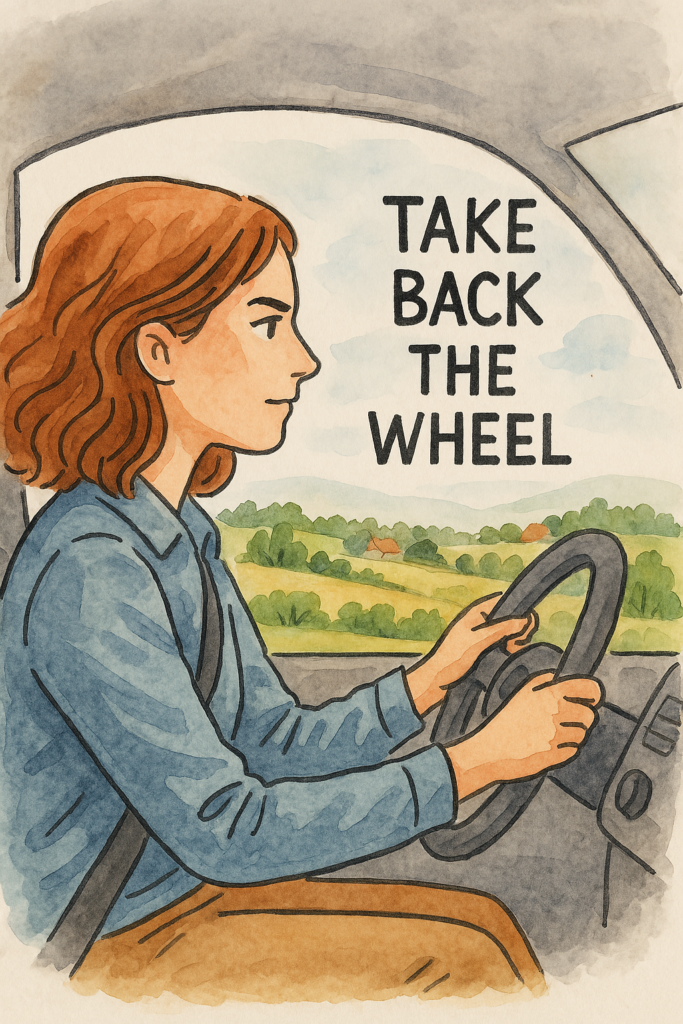
Losing power doesn’t feel like a collapse. It feels like compromise. You don’t notice it at first. You skip the morning walk once, then twice. You downplay what you want. You swallow your opinion to keep the peace. You call it “adjusting.”
Eventually, you start forgetting what it felt like to drive your own life. You move, but you’re not the one steering.
I’ve done it. Smiled through discomfort. Said yes out of habit. Avoided decisions so I wouldn’t have to be the one responsible if they went sideways. It felt smart at the time—easier than conflict, less exhausting than disappointment. But the longer I played it safe, the smaller I became. Not all at once. Gradually. Until I woke up to a life that looked fine from a distance and felt like cardboard from the inside.
The most dangerous stories aren’t the ones we tell others. They’re the ones we repeat to ourselves until we stop questioning them. The old narratives. The recycled explanations. The pain we’ve dressed up as personality traits.
Not everything that happened to me deserved a sequel. But I gave it one anyway. Over and over.
Living like that makes presence nearly impossible. You can’t focus when half your energy is tied up in rehearsing what went wrong or pre-planning every future disaster. Even silence doesn’t feel restful—it feels like waiting for something to go wrong.
Being present takes effort. Not in a spiritual, scented-candle sort of way. Just in the basic discipline of noticing when I’m reacting instead of choosing. When I’m nodding just to move things along. When I’m reaching for my phone instead of facing something I don’t want to feel.
I tried to fix it by controlling everything. The calendar, the food, the inputs, the people. I built rules. I optimized. I read all the right things. That worked for a while—until something unpredictable showed up and wrecked my plans in five minutes. Then I’d unravel, take it personally, and call it “being sensitive.”
That pattern exhausted me. And it didn’t make me more in control. It made me more fragile.
What actually helped was giving up the illusion of control. Not in a passive way. Just in the sense that I stopped expecting life to move according to my timeline. I started focusing on what I could actually direct: how I respond, how I show up, what I say yes or no to, and how quickly I stop spiraling when something throws me off.
Discipline became less about perfection and more about boundaries. Not for other people—for myself. I set fewer goals and made better habits. I stopped arguing with reality. I stopped calling every whim a need. I stopped glamorizing chaos and started making space for quiet decisions.
That didn’t make me rigid. It made me clear.
I also stopped calling everything self-care. Sometimes it’s just procrastination with better branding. Real care isn’t always soft. Sometimes it’s doing the thing I’ve avoided all week. Sometimes it’s going to bed when I’d rather scroll. Sometimes it’s sitting with a thought instead of outrunning it with noise.
Discipline doesn’t kill freedom. It protects it. The more structure I gave myself, the more choices I had. I could think clearly. I had more energy. I didn’t have to recover from my own decisions every morning.
I stopped letting urgency decide my day. Not everything deserves a response. Not everyone gets a reaction. The more space I created, the more I realized how much of my energy I was bleeding into people, problems, and platforms that didn’t matter.
I’m not immune to distraction. I still slip. I still chase comfort. I still waste time. But I don’t stay there. That’s the difference now. I don’t spiral and call it a phase. I notice. I course-correct. I get back.
Progress, for me, isn’t some dramatic transformation. It’s recovery time. How quickly I come back to myself when I lose the thread.
This isn’t a manifesto. It’s maintenance. It’s doing the work quietly and consistently, even when no one claps. It’s not flashy. But it’s how I take the wheel back every day.
And no, I don’t owe anyone an explanation. Not for the no’s. Not for the boundaries. Not for the space I protect like my life depends on it—because it does.
You either drive, or you get dragged.
I’m not interested in being agreeable at the cost of being alive. Not anymore.
I’ve got a grip on the wheel now. And I’m not letting go.
Leave a Reply